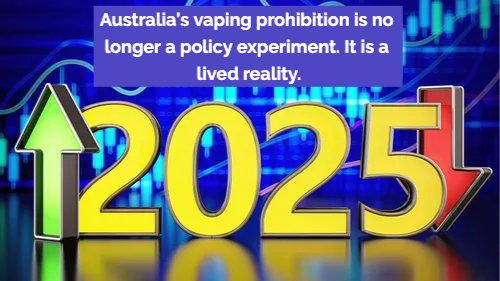ACOSH Doubles Down on Fear—But It’s Time for Facts, Not Fantasy
- Alan Gor

- May 2, 2025
- 3 min read


Alan Gor 02 May 2025
In a now-familiar move, the Australian Council on Smoking and Health (ACOSH) has issued a media release condemning the Coalition’s plan to regulate and tax vaping through legal retail outlets. With loaded language like “flood the market,” “fuel youth addiction,” and “win for Big Tobacco,” ACOSH clings to a crumbling narrative, ignoring evidence, international precedent, and Australia’s own failures.
Let’s unpack the fear-mongering and set the record straight.
**1. ACOSH: “This is exactly what Big Tobacco have been asking for.”
Reality: The black market and pharma monopolies are the true winners under prohibition.
The current policy restricting nicotine vaping to prescription-only pharmacy sales has gifted Big Tobacco and Big Pharma an effective monopoly. With independent vape businesses locked out, smokers are left with two options: turn to illegal markets or struggle through costly, confusing prescription routes dominated by pharmaceutical substitutes.
Big Tobacco thrives when adult alternatives are criminalised. Regulation threatens their grip, not reinforces it.
**2. ACOSH: “It will recklessly flood the market, fuel youth addiction…”
Reality: The market is already flooded by criminals. Regulation is how we clean it up.**
Unregulated, illegal vapes are already easily accessible through social media, convenience stores, and word-of-mouth sales. The Australian Border Force and state police have repeatedly reported record seizures, warehouse raids, and organised criminal links to vape distribution.
By contrast, legal retail regulation introduces licensing, age verification, product safety standards, and penalties for misconduct, tools that prohibition cannot provide.
**3. ACOSH: “The UK and New Zealand failed to keep vapes out of kids’ hands.”
Reality: Both countries have falling smoking rates and responsible enforcement, not failure.
In the UK, vaping is endorsed as a quit aid by the NHS and Public Health England (now OHID). Smoking among adults and youth is at historic lows. Vaping among never-smoking teens remains rare.
New Zealand has implemented a licensing system, restricted advertising, flavour rules, and age checks, and Māori smoking rates have significantly declined, in part due to greater access to vaping.
🟩 Supporting Evidence:
Cochrane Review 2024: Vaping is more effective than NRT for quitting smoking
**4. ACOSH: “There is never a scenario where trading kids’ health for income is acceptable.”
Reality: Straw man. This policy is about adult smokers, not children.
The goal of vaping regulation is not to sell to kids, but to give adult smokers legal access to safer alternatives. If retailers are breaking the law, enforce the law. That’s how we treat alcohol and tobacco sales, why not vaping?
This policy doesn’t “trade kids’ health for income”; it balances adult autonomy, public health, and government oversight. Vapes should be sold by licensed, accountable retailers, not dodgy under-the-counter dealers.
**5. ACOSH: “Vapes do not belong in the hands of retailers… it normalises addiction.”
Reality: What normalises addiction is banning safer options while keeping cigarettes legal.
Let’s not forget: cigarettes kill more than 24,000 Australians every year. If ACOSH is serious about public health, why is it defending a system that lets people buy Marlboros from the servo but forces vapers to navigate a bureaucratic maze, or the black market?
The only thing “normalised” by the current system is failure.
Conclusion: ACOSH’s Position Hurts the Very People It Claims to Protect
Adults who smoke are not enemies. They are people who deserve truth, options, and dignity. The path to a smoke-free future is through harm reduction, not through panic-driven policies that have already failed.
Let’s regulate vaping properly, protect youth through enforcement, and finally break the cycle of smoking-related disease.


